This article was co-authored by wikiHow Staff. Our trained team of editors and researchers validate articles for accuracy and comprehensiveness. wikiHow's Content Management Team carefully monitors the work from our editorial staff to ensure that each article is backed by trusted research and meets our high quality standards.
There are 9 references cited in this article, which can be found at the bottom of the page.
This article has been viewed 101,243 times.
Learn more...
Becoming a lawyer is a long process, with many steps along the way. It will take hard work and lots of determination. The possibility of a respected, well-paying career with the opportunity to make an impact in the world is a great motivator for all the effort, however.
Steps
Preparing for Admission to Law School
-
1Complete Secondary School and graduate with your high school diploma. In the process, you might be able to gain insight into legal careers by joining a debate club or mock trial team, if your school offers them.
-
2Finish a four-year Bachelor’s degree. Your major or concentration can be in any subject, as law schools do not require a particular set of undergraduate courses for admission. Thus, you can choose between a BA, BS, BBA, or other degree.
- Choose a degree in a subject you like. [1] Then, you are more likely to earn good grades, receive good preparation, and get to know professors who can write strong letters of recommendation for you when you apply to law school.
- At the same time, choose courses that will challenge you to think critically, write well, and learn to do research—all skills that will serve you well in law school and afterwards.
- Whatever degree you choose, good preparation includes courses in English, philosophy, history, government, economics, and sociology.
- Work hard to earn high grades as an undergraduate. The average student admitted to law schools in Canada has an undergraduate GPA above 3.5 on a 4.0 scale, and at the most selective schools, the average GPA hovers around 3.9.[2]
Applying to Law School
-
1Take the Law School Admissions Test (LSAT). The LSAT is held four times a year. [3] There are five 35-minute sections of multiple-choice answers on the test, as well as a writing section. The test is designed to evaluate your reading, analytical, and logical skills.[4]
- The LSAT is scored on a scale of 120 to 180. The average student admitted to a law school in Canada has an LSAT score of 160 or above.[5]
- Scoring well on the test is important for admission to law school. You can take the LSAT several times in an effort to improve your score, but find out if the school(s) you are applying to look at the lowest score, highest score, or an average.
- Many students take the LSAT the summer after their third year of a university degree program, or during the first term of their fourth year.
- You can take an LSAT Prep course. Many prep courses have a fee, but you may be able to find a free course or a fee waiver [6]
- You can also do self-study exercises to prepare for the test. A free sample test and sample exercises are available from the Law School Admissions Council (LSAC), which administers the LSAT.[7]
-
2Decide where you want to study and practice law. Quebec law is based on French Civil law, while law in the other provinces and territories is based on English common law. Practically speaking, you will need to train in the kind of law applicable to where you want to practice as a lawyer. [8]
-
3Assemble an excellent application dossier. In addition to your GPA and LSAT score, law school admissions councils may consider your academic record and course selection, work experience, and volunteer efforts, and other elements.[9]
- Personal statements are typically required as part of law school applications. These are a chance to show off your writing skills, and to explain your personal, academic, and professional motivations.
- Letters of recommendation are also required for many applications. Depending on the school you are applying to, these will consist of academic references from professors who know you, non-academic references, or a mix. Give your letter writers plenty of time to write a recommendation for you--let them know you need one months ahead of time, if you can. Not only is this courteous, it also gives them time to write the strongest letter they can to support you.
- Each law school may weigh each aspect of your dossier differently. The LSAC provides information on how each school evaluates applicants.[10] You can use this information to help you choose schools that seem like a good fit for you.
-
4Apply to one or more of the 16 law schools in Canada. Choose schools based on a variety of factors that depend on your needs, interests, and preparation.
- In making your choice, consider things like: school size, location, and prestige, the cost of attendance, availability of financial aid, job placement statistics, the types of students that attend, and whether or not it includes courses in French.
- In addition, you should compare the profile of admitted students at each school against your own application dossier (including LSAT score, undergraduate GPA, record of accomplishments, personal statements, and letters of recommendation) to decide which schools are most likely to admit you. [11]
- Some schools offer special programs that you may want to consider, including programs combining law and social work, law and business, and dual J.D. and Ph.D degrees.
- Pay attention to application deadlines for law schools, which are usually in the fall of each year.
Earning your Legal Degree
-
1Complete the three years of law school required to earn the standard legal degree, a J.D. (juris doctor). You will begin with introductory courses in the first year, learning the basics of legal research and writing. In your second and third years, you will take more courses based on your interests and potential areas of specialization.[12]
- First-year courses are typically compulsory and cover subjects like contracts, criminal law, and legal writing.
- First-year students are sometimes required to participate in "moot court," where you practice running a mock trial.[13]
- You may choose from specializations including environmental law, patent law, corporate law, and many others.
- Courses in law often utilize the "case method," in which you are asked to understand the implications of judicial opinions drawn from a variety of perspectives.[14] Your law professor will ask questions that probe students' ability think critically about legal situations, so you will need to be prepared to participate.
-
2Develop strong study habits. Even if you excelled as an undergraduate student, law school can feel very demanding. Developing strong study habits will help you stay on top of a grueling course load and competitive atmosphere.
- Exams are very important in courses at law school. Often, grades in a course are determined solely on an exam given at the end of the semester.[15]
- Joining a study group can be a way to find support, although maintaining a group takes diligence.
-
3Participate in curricular and extracurricular activities as well as volunteer experiences. This will give you opportunities to network and gain experience, which is invaluable when it comes time to finding a job.
- Seek out opportunities to participate in legal aid or interning to do legal research for private practices and government.[16]
- Writing for your school's law review can also provide tangible experience, bolster your professional credentials, and impress potential employers.
-
4Apply for internships known as “articling” in the summer after your second year. Articling, or working for a licensed and practicing law professional, will give you valuable legal experience. After receiving your J.D., you are required to article for a time in order to become certified to practice law.
Becoming Licensed and Finding a Job as a Lawyer
-
1Pass the bar association course. As difficult as it is to achieve, earning a legal degree is not enough to practice as a lawyer; you must also become licensed. The bar association of each province has a particular set of requirements for you to become certified to practice. [17]
- The bar examination itself is offered three times a year. It tests your knowledge in several practice areas. There are two parts: the Barrister examination tests your knowledge of public law, criminal procedure, family law, and civil litigation; the Solicitor examination tests your knowledge of real estate law, business law, wills, trust, and estate administration. Each part is about seven hours long.
-
2Article for several months. You may work for a private practice, or for public legal services. How long you are obligated to article for depends on the province, but it ranges from several months up to a year.
- In Ontario, you may instead complete the Law Society of Upper Canada’s Law Practice Program (LPP), which consists of four months each of training and work placement. [18]
-
3Begin looking for work as a lawyer! Your options include private practice, public service, government, business, and other sectors.
- Jobs at prestigious law firms or government departments are highly sought after and can be hard to come by. Don't overlook openings with small firms and local governments. You can also look for relevant non-attorney work, such as a job as a legal clerk. Such positions can provide valuable experience and get your foot in the door with a potential employer, in case a position as an attorney opens up.
-
4Hone your networking skills. Networking, as in many fields, can be critical for finding a job as a lawyer.
- Experience articling, volunteering, or interning is a great way to make contacts in the world of law, and can sometimes lead directly to a job.
- If you feel like your network is too small, you can try informational interviews. Even if a firm isn't hiring, you can ask to meet with attorneys to find out about their practice, and develop contacts in the process. In general, think of every time you meet a legal professional as an opportunity to network.
- Don't overlook the importance of your social media presence. Potential employers will notice how you are presented online. Make sure you display yourself professionally. Think of your online identity as an extension of your personal "brand" as a lawyer.
-
5Be persistent. The job search might take a while, and a lot of effort. Be confident while you are searching, and concentrate on developing your experience and expertise any way you can.
Community Q&A
-
QuestionHas an Indian ever become an advocate in Canada?
 AvestaCommunity AnswerYes.
AvestaCommunity AnswerYes. -
QuestionIs there an age requirement for becoming a lawyer?
 Eric ShielsCommunity AnswerThere is no requirement for becoming a lawyer, however you must complete about 7 years of post-secondary education and article for between 9 and 15 months.
Eric ShielsCommunity AnswerThere is no requirement for becoming a lawyer, however you must complete about 7 years of post-secondary education and article for between 9 and 15 months. -
QuestionCan I become a lawyer at age 13 in grade 8?
 Upnorth HereTop AnswererNo. You would need a high-school diploma, a 4-year college degree and a 3-year law degree in order to be a lawyer. To become a licensed attorney also requires that you pass the bar exam of one or more jurisdictions (e.g., your state or country).
Upnorth HereTop AnswererNo. You would need a high-school diploma, a 4-year college degree and a 3-year law degree in order to be a lawyer. To become a licensed attorney also requires that you pass the bar exam of one or more jurisdictions (e.g., your state or country).
References
- ↑ http://www.law.utoronto.ca/admissions/youth-outreach/so-you-want-become-lawyer
- ↑ http://www.lsac.org/jd/choosing-a-law-school/canadian
- ↑ http://www.lsac.org/jd/lsat/test-dates-deadlines
- ↑ http://www.lsac.org/jd/lsat/about-the-lsat
- ↑ http://www.lsac.org/jd/choosing-a-law-school/canadian
- ↑ http://www.law.utoronto.ca/admissions/youth-outreach/so-you-want-become-lawyer
- ↑ http://www.lsac.org/jd/lsat/preparing-for-the-lsat
- ↑ http://www.lawyeredu.org/canada.html
- ↑ http://www.lsac.org/jd/choosing-a-law-school/canadian/law-schools-select-applicants
- ↑ http://www.lsac.org/jd/choosing-a-law-school/canadian
- ↑ http://www.law.utoronto.ca/admissions/youth-outreach/so-you-want-become-lawyer
- ↑ http://www.lsac.org/jd/choosing-a-law-school/canadian/legal-education-canada
- ↑ http://www.lsac.org/jd/choosing-a-law-school/canadian/legal-education-canada
- ↑ http://www.lsac.org/jd/choosing-a-law-school/canadian/legal-education-canada
- ↑ http://www.lsac.org/jd/choosing-a-law-school/canadian/legal-education-canada
- ↑ http://www.law.utoronto.ca/admissions/youth-outreach/so-you-want-become-lawyer
- ↑ http://www.lawyeredu.org/canada.html
- ↑ http://www.law.utoronto.ca/admissions/youth-outreach/so-you-want-become-lawyer
- ↑ http://flsc.ca/national-committee-on-accreditation-nca/faqs/
About This Article
To become a lawyer in Canada, start by joining a debate club or mock trial team while you’re still in high school to give you valuable insight into legal careers. Then, attend a university and focus on getting good grades in classes like English, history, and sociology. During your last year as an undergrad, take the LSAT and apply to law schools. Once you’re in law school, find volunteer experiences and extracurricular activities to network and gain experience, such as working in legal aid or doing research for a private firm. For tips on how to find the best articling internships after graduating from law school, read on!


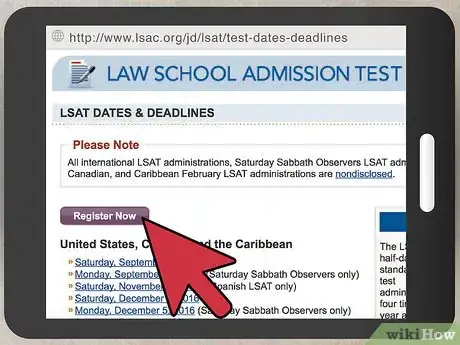

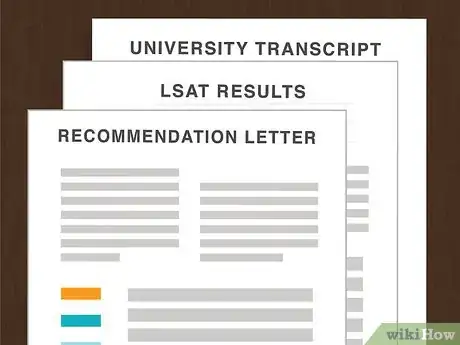
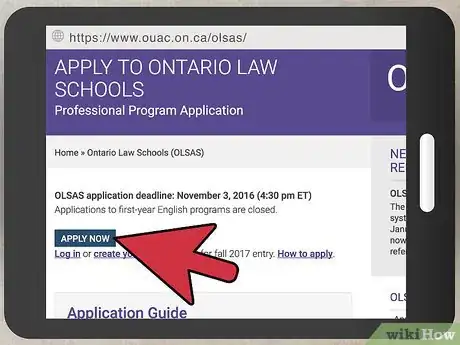
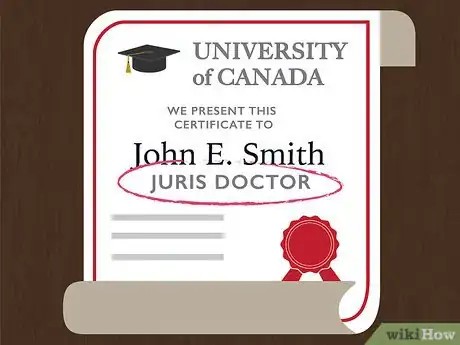



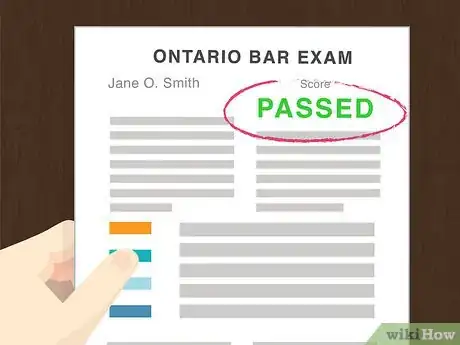









-Step-13-Version-3.webp)





-Step-13.webp)

-Step-9-Version-2.webp)
















































